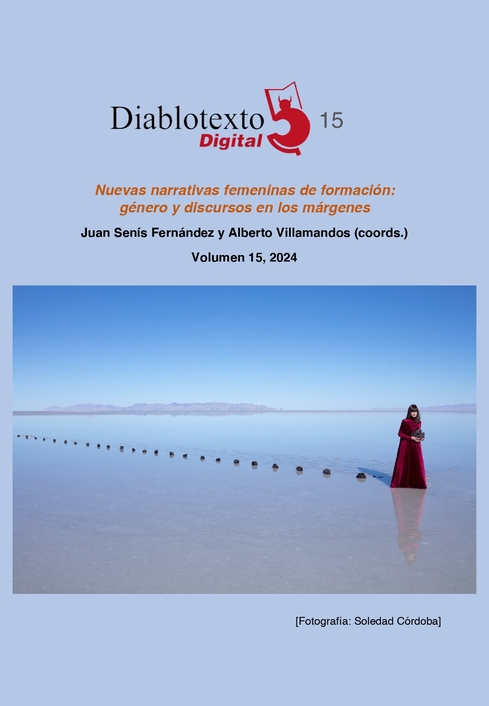Challenging Urbanormativity: Knowledge, Apprenticeships, and Vindication of the Rural Environment in Leona, o la fiera vida
DOI:
https://doi.org/10.7203/diablotexto.15.28100Keywords:
Dominican Republic, urbanormativity, countryside, Bildungsroman, apprenticeship, formation Abstract
Abstract
In this article we analyze how the countryside is vindicated in Ángela Hernández’s Leona, o la fiera vida (2013) through the protagonist’s apprenticeship in the rural environment. Emphasis will be placed on how the Bildungsheldin’s formation —although it does not idealize or present clichés about life in the countryside— challenges urbanormative perspectives that see rural subjects and spaces as uncultured and uncivilized.
 Downloads
Downloads
 References
References
Bakhtin, Mikhail M (2005). “La novela de educación y su importancia en la historia del realismo”. En Mikhail M. Bakhtin, Estética de la creación verbal. Traductora, Tatiana Bubnova. Madrid, Siglo XXI, pp. 200-247.
Doub, Yolanda (2010). Journeys of Formation: The Spanish American Bildungsroman. Nueva York, Peter Lang.
Escudero Prieto, Víctor (2022). Salir al mundo: la novela de formación en las
trayectorias de la Modernidad hispanoamericana. Madrid, Iberoamericana – Vervuert.
Fernández Vázquez, José Santiago (2002). La novela de formación: una aproximación ideológica colonial europea desde la óptica del Bildungsroman clásico. Alcalá de Henares, Servicio de Publicaciones Universidad de Alcalá.
Fulkerson, Gregory M. y Thomas, Alexander R. (2019). Urbanormativity: Reality, Representation, and Everyday Life. New York, Lexington Books.
García Calderón, Myrna (2012). “El campo y la ciudad en Mudanza de los sentidos de Ángela Hernández”. En Myrna García Calderón, Espacios de la memoria en el Caribe Hispánico insular y sus diásporas. San Juan, Ediciones Callejón, pp. 88-96.
García Canclini, Néstor (2001). Culturas híbridas: estrategias para entrar y salir de la modernidad. Buenos Aires, Paidós.
Hernández, Ángela (2001). Mudanza de los sentidos. Santo Domingo, Editora Cole.
Hernández, Ángela (2003). Charamicos. Santo Domingo, Editora Cole.
Hernández, Ángela (2013). Leona, o la fiera vida. Santo Domingo, Alfaguara.
Horn, Maja (2014). Masculinity After Trujillo. Gainesville, University of Florida Press.
López, Magdalena (2015). “Charamicos: la derrota de la modernidad revolucionaria dominicana”. En Magdalena López, Desde el fracaso: narrativas del Caribe insular hispano en el siglo XXI. Madrid, Editorial Verbum, pp.181-199.
Lorenzo Feliciano, Violeta (2012). “Del campo a la ciudad: migración, modernidad fallida y aprendizaje transgresor en Mudanza de los sentidos de Ángela Hernández”. Disponible en <http://www.habanaelegante.com/Fall_Winter_2012/Dossier_DR_Lorenzo.html> [Fecha de consulta: 3 de noviembre de 2021].
Lorenzo Feliciano, Violeta (2018). “Un entorno hecho charamicos: los doce años de Balaguer y la reescritura del Bildungsroman de Ángela Hernández”. En Luis Fernando Restrepo, Violeta Lorenzo Feliciano y Sophie von Werder (eds.), El malestar del posconflicto: aportes de la crítica literaria y cultural. Bogotá, Instituto Caro y Cuervo, pp. 87-103.
Lorenzo Feliciano, Violeta (2019). “Crecer durante una guerra civil: un vistazo a Leona, o la fiera vida de Ángela Hernández”, Romance Notes (2019), vol. 59, n.º 3, pp. 547-558.
Moretti, Franco (2000) [1987]. The Way of the World: The Bildungsroman in European Culture. Nueva York, Verso.
Rodríguez, Néstor E. (1999). “Tras la poética del desanclaje: entrevista con Ángela Hernández”, Inti (1999), vol. 49-50, pp. 353-360.
Thomas, Alexander R. et al. (2011). Critical Rural Theory: Structure, Space, Culture. New York, Lexington Books.
Torres, Alexander (2020). Bastardos de la modernidad: el Bildungsroman roquero en América Latina. Nueva York, Peter Lang
Williams, Raymond (1973). The Country and the City. New York, Oxford University Press.
Downloads
Published
How to Cite
-
Abstract80
-
PDF (Español)44
Issue
Section
License
Licencia de reconocimiento de Creative Commons “Reconocimiento - No Comercia l- Sin Obra Derivada
Authors who publish with this journal agree to the following items:
The authors will keep their copyright and guarantee the journal the right of first publication of their work, which will be simultaneously subject to the Creative Commons license that allows third parties to share the work indicating its author and its first publication in the journal. The authors may adopt other non-exclusive license agreements to distribute the version of the published work (e.g., depositing it in an institutional telematic file or publishing it in a monographic volume), with an acknowledgment of its initial publication in this journal. The authors are allowed and encouraged to disseminate their work through the Internet (e.g., in institutional telematic archives or on their website) before and during the submission process, which can produce interesting exchanges and increase citations of the published work. (See Effect of Open Access)




